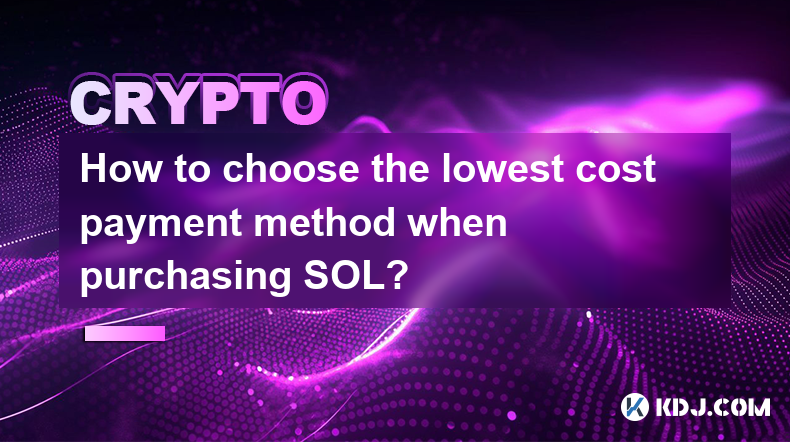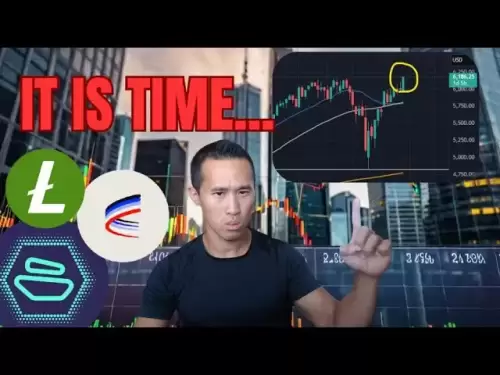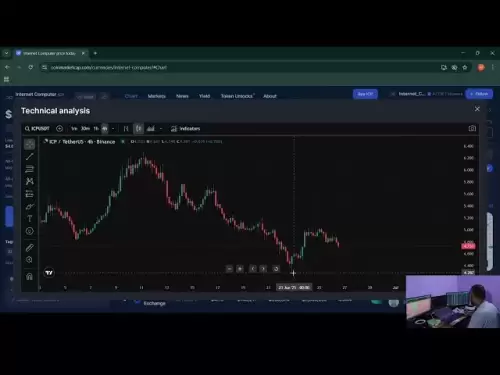-
 Bitcoin
Bitcoin $107,247.2038
-0.18% -
 Ethereum
Ethereum $2,424.7947
0.34% -
 Tether USDt
Tether USDt $1.0003
-0.02% -
 XRP
XRP $2.1171
-3.33% -
 BNB
BNB $645.6618
0.06% -
 Solana
Solana $141.5898
-1.32% -
 USDC
USDC $0.9998
0.00% -
 TRON
TRON $0.2710
-0.41% -
 Dogecoin
Dogecoin $0.1602
-2.99% -
 Cardano
Cardano $0.5553
-2.28% -
 Hyperliquid
Hyperliquid $36.3019
-2.42% -
 Bitcoin Cash
Bitcoin Cash $491.7212
2.04% -
 Chainlink
Chainlink $13.0810
-0.23% -
 Sui
Sui $2.6080
-5.06% -
 UNUS SED LEO
UNUS SED LEO $9.0040
-0.05% -
 Stellar
Stellar $0.2350
-3.06% -
 Avalanche
Avalanche $17.2294
-2.31% -
 Toncoin
Toncoin $2.8075
-1.05% -
 Shiba Inu
Shiba Inu $0.0...01121
-3.43% -
 Litecoin
Litecoin $84.2215
-0.32% -
 Hedera
Hedera $0.1429
-4.88% -
 Monero
Monero $312.2199
-0.90% -
 Dai
Dai $0.9997
-0.01% -
 Ethena USDe
Ethena USDe $0.9999
-0.02% -
 Polkadot
Polkadot $3.2973
-2.60% -
 Bitget Token
Bitget Token $4.4742
3.12% -
 Pi
Pi $0.5631
-10.10% -
 Uniswap
Uniswap $6.7817
-2.06% -
 Pepe
Pepe $0.0...09252
-3.74% -
 Aave
Aave $251.3830
-2.24%
How to choose the lowest cost payment method when purchasing SOL?
To minimize costs when buying SOL, use bank transfers on exchanges with low fees, compare fee schedules, and consider batch purchases to reduce overall fees.
Mar 28, 2025 at 02:00 am

How to Choose the Lowest Cost Payment Method When Purchasing SOL
Understanding SOL Purchase Costs
Buying Solana (SOL) involves more than just the price of the cryptocurrency itself. Transaction fees, deposit fees, and exchange fees all contribute to the final cost. Understanding these different fee structures is crucial for minimizing your overall expenditure. Different platforms offer varying fee structures, so careful comparison is essential before committing to a purchase. This guide will help navigate the complexities of choosing the lowest cost payment method for your SOL acquisition.
Payment Methods and Their Associated Costs
Several methods exist for purchasing SOL, each with its own fee structure. Popular options include using credit/debit cards, bank transfers, peer-to-peer exchanges, and cryptocurrency exchanges that support direct SOL purchases.
Credit/Debit Cards: These offer convenience but usually incur higher transaction fees compared to other methods. The fees are often a percentage of the transaction value, adding significantly to the cost, especially for larger purchases. Always check the fee schedule before proceeding.
Bank Transfers (ACH or Wire Transfers): Bank transfers typically offer lower fees than credit/debit cards. ACH transfers, processed electronically, are generally cheaper and faster than wire transfers, which are more expensive but often quicker for larger amounts. Processing times vary depending on the exchange and your bank.
Peer-to-Peer (P2P) Exchanges: These platforms connect buyers and sellers directly, sometimes bypassing traditional exchange fees. However, they carry inherent risks, including scams and potential security vulnerabilities. Thorough due diligence is essential when using P2P platforms. Always verify the seller's reputation and use secure payment methods.
Cryptocurrency Exchanges: Exchanges offering direct SOL purchases often have their own fee structures. These fees can vary depending on the trading volume, the payment method used, and the specific exchange. Compare fees across multiple exchanges before choosing one. Some exchanges offer lower fees for larger trades or users with higher trading volume.
Minimizing Transaction Costs: Strategies and Tips
To minimize costs, consider these strategies:
Compare Exchange Fees: Different exchanges charge different fees. Actively compare fee schedules across several reputable exchanges before making a purchase. Look for exchanges that offer lower trading fees or maker/taker fee structures that benefit you.
Utilize Lower-Fee Payment Methods: Prioritize bank transfers (ACH) over credit/debit cards whenever possible. ACH transfers generally have significantly lower fees, making them a more cost-effective option.
Consider Batch Purchases: If you plan on buying a substantial amount of SOL, consider making a single, larger purchase rather than multiple smaller ones. This can reduce the overall percentage of fees paid.
Look for Fee Waivers or Promotions: Some exchanges periodically offer fee waivers or promotions for specific payment methods or during certain periods. Keep an eye out for these opportunities to save money.
Understand Network Fees (Gas Fees): When transferring SOL from an exchange to your personal wallet, you'll need to account for network fees (gas fees). These fees vary depending on network congestion. Aim to transfer during periods of lower network activity to reduce these costs.
Choosing the Right Exchange
The exchange you choose significantly impacts your overall cost. Factors to consider include:
- Trading Fees: The percentage charged on each trade.
- Deposit Fees: Fees for depositing funds into your exchange account.
- Withdrawal Fees: Fees for withdrawing SOL from your exchange account.
- Supported Payment Methods: The payment options the exchange accepts.
- Security and Reputation: The exchange's security measures and its overall reputation within the cryptocurrency community.
Security Considerations
While focusing on minimizing costs, never compromise on security. Always choose reputable exchanges with robust security measures. Avoid exchanges with a history of security breaches or questionable practices. Secure your account with strong passwords and two-factor authentication.
Frequently Asked Questions
Q: What is the cheapest way to buy SOL?
A: The cheapest method typically involves using bank transfers (ACH) on an exchange with low trading fees. However, always compare fees across multiple exchanges as they vary.
Q: Are there any hidden fees when buying SOL?
A: Yes, be aware of potential hidden fees like deposit fees, withdrawal fees, and network (gas) fees. Carefully review the fee schedule of your chosen exchange.
Q: How can I avoid high transaction fees?
A: Choose lower-fee payment methods like bank transfers, compare exchange fees, and consider batch purchases to reduce the overall percentage of fees paid.
Q: What are network fees (gas fees) when buying SOL?
A: Network fees are the costs associated with transferring SOL on the Solana blockchain. They fluctuate based on network congestion.
Q: Is it safe to buy SOL using P2P exchanges?
A: P2P exchanges carry inherent risks. Exercise extreme caution, verify seller reputation, and use secure payment methods. Consider the higher risk against the potential for lower fees.
Q: How do I compare exchange fees effectively?
A: Visit each exchange's website and carefully review their fee schedule. Pay attention to trading fees, deposit fees, and withdrawal fees. Look for transparency in their fee structure.
Q: What should I do if I encounter unexpectedly high fees?
A: Contact the exchange's customer support to inquire about the fees. Consider using a different exchange or payment method for future purchases. Review your transaction history to ensure accuracy.
Disclaimer:info@kdj.com
The information provided is not trading advice. kdj.com does not assume any responsibility for any investments made based on the information provided in this article. Cryptocurrencies are highly volatile and it is highly recommended that you invest with caution after thorough research!
If you believe that the content used on this website infringes your copyright, please contact us immediately (info@kdj.com) and we will delete it promptly.
- Crypto Presales in 2025: MAGACOIN FINANCE and the Hunt for New Coins
- 2025-06-27 04:50:12
- Senate, Bitcoin, and the Reserve: What's the Deal?
- 2025-06-27 04:30:12
- Bitcoin, Collateral, and Mortgages: A New York Perspective on Crypto's Housing Play
- 2025-06-27 04:30:12
- Trump, Crypto, and Stablecoins: A New York Minute on WLF's Bold Moves
- 2025-06-27 04:57:13
- Crypto Liquidity, Centralized Exchanges, and 2025 Trends: What's the Deal?
- 2025-06-27 04:35:12
- Meme Coins in 2025: Long-Term Growth or Just a Passing Fad?
- 2025-06-27 05:02:09
Related knowledge

How to customize USDT TRC20 mining fees? Flexible adjustment tutorial
Jun 13,2025 at 01:42am
Understanding USDT TRC20 Mining FeesMining fees on the TRON (TRC20) network are essential for processing transactions. Unlike Bitcoin or Ethereum, where miners directly validate transactions, TRON uses a delegated proof-of-stake (DPoS) mechanism. However, users still need to pay bandwidth and energy fees, which are collectively referred to as 'mining fe...

USDT TRC20 transaction is stuck? Solution summary
Jun 14,2025 at 11:15pm
Understanding USDT TRC20 TransactionsWhen users mention that a USDT TRC20 transaction is stuck, they typically refer to a situation where the transfer of Tether (USDT) on the TRON blockchain has not been confirmed for an extended period. This issue may arise due to various reasons such as network congestion, insufficient transaction fees, or wallet-rela...

How to cancel USDT TRC20 unconfirmed transactions? Operation guide
Jun 13,2025 at 11:01pm
Understanding USDT TRC20 Unconfirmed TransactionsWhen dealing with USDT TRC20 transactions, it’s crucial to understand what an unconfirmed transaction means. An unconfirmed transaction is one that has been broadcasted to the blockchain network but hasn’t yet been included in a block. This typically occurs due to low transaction fees or network congestio...

How to check USDT TRC20 balance? Introduction to multiple query methods
Jun 21,2025 at 02:42am
Understanding USDT TRC20 and Its ImportanceUSDT (Tether) is one of the most widely used stablecoins in the cryptocurrency market. It exists on multiple blockchain networks, including TRC20, which operates on the Tron (TRX) network. Checking your USDT TRC20 balance accurately is crucial for users who hold or transact with this asset. Whether you're sendi...

What to do if USDT TRC20 transfers are congested? Speed up trading skills
Jun 13,2025 at 09:56am
Understanding USDT TRC20 Transfer CongestionWhen transferring USDT TRC20, users may occasionally experience delays or congestion. This typically occurs due to network overload on the TRON blockchain, which hosts the TRC20 version of Tether. Unlike the ERC20 variant (which runs on Ethereum), TRC20 transactions are generally faster and cheaper, but during...

The relationship between USDT TRC20 and TRON chain: technical background analysis
Jun 12,2025 at 01:28pm
What is USDT TRC20?USDT TRC20 refers to the Tether (USDT) token issued on the TRON blockchain using the TRC-20 standard. Unlike the more commonly known ERC-20 version of USDT (which runs on Ethereum), the TRC-20 variant leverages the TRON network's infrastructure for faster and cheaper transactions. The emergence of this version came as part of Tether’s...

How to customize USDT TRC20 mining fees? Flexible adjustment tutorial
Jun 13,2025 at 01:42am
Understanding USDT TRC20 Mining FeesMining fees on the TRON (TRC20) network are essential for processing transactions. Unlike Bitcoin or Ethereum, where miners directly validate transactions, TRON uses a delegated proof-of-stake (DPoS) mechanism. However, users still need to pay bandwidth and energy fees, which are collectively referred to as 'mining fe...

USDT TRC20 transaction is stuck? Solution summary
Jun 14,2025 at 11:15pm
Understanding USDT TRC20 TransactionsWhen users mention that a USDT TRC20 transaction is stuck, they typically refer to a situation where the transfer of Tether (USDT) on the TRON blockchain has not been confirmed for an extended period. This issue may arise due to various reasons such as network congestion, insufficient transaction fees, or wallet-rela...

How to cancel USDT TRC20 unconfirmed transactions? Operation guide
Jun 13,2025 at 11:01pm
Understanding USDT TRC20 Unconfirmed TransactionsWhen dealing with USDT TRC20 transactions, it’s crucial to understand what an unconfirmed transaction means. An unconfirmed transaction is one that has been broadcasted to the blockchain network but hasn’t yet been included in a block. This typically occurs due to low transaction fees or network congestio...

How to check USDT TRC20 balance? Introduction to multiple query methods
Jun 21,2025 at 02:42am
Understanding USDT TRC20 and Its ImportanceUSDT (Tether) is one of the most widely used stablecoins in the cryptocurrency market. It exists on multiple blockchain networks, including TRC20, which operates on the Tron (TRX) network. Checking your USDT TRC20 balance accurately is crucial for users who hold or transact with this asset. Whether you're sendi...

What to do if USDT TRC20 transfers are congested? Speed up trading skills
Jun 13,2025 at 09:56am
Understanding USDT TRC20 Transfer CongestionWhen transferring USDT TRC20, users may occasionally experience delays or congestion. This typically occurs due to network overload on the TRON blockchain, which hosts the TRC20 version of Tether. Unlike the ERC20 variant (which runs on Ethereum), TRC20 transactions are generally faster and cheaper, but during...

The relationship between USDT TRC20 and TRON chain: technical background analysis
Jun 12,2025 at 01:28pm
What is USDT TRC20?USDT TRC20 refers to the Tether (USDT) token issued on the TRON blockchain using the TRC-20 standard. Unlike the more commonly known ERC-20 version of USDT (which runs on Ethereum), the TRC-20 variant leverages the TRON network's infrastructure for faster and cheaper transactions. The emergence of this version came as part of Tether’s...
See all articles
























































































